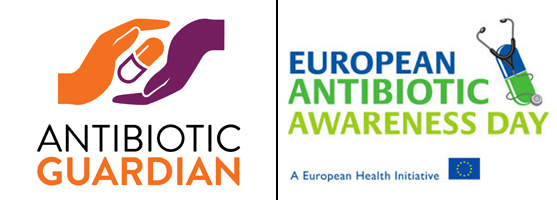
Antibiotics are important medicines for treating bacterial infections in both humans and animals. However, bacteria can adapt and find ways to survive the effects of an antibiotic.
This means antibiotics are losing their effectiveness at an increasing rate. The more we use antibiotics, the greater the chance bacteria will become resistant to them and they can no longer be used to treat infections. Learn more about antibiotics.
Antibiotic resistance is one of the most significant threats to patients' safety in Europe. It is driven by overusing antibiotics and prescribing them inappropriately.
To slow down the development of antibiotic resistance, it is important to use antibiotics in the right way – to use the right drug, at the right dose, at the right time, for the right duration. Antibiotics should be taken as prescribed, and never saved for later or shared with others.

Watch What is antibiotic resistance, and why should we care? and visit the Antibiotic Guardian website to make a pledge about how you'll make better use of antibiotics and help save this vital medicine from becoming obsolete.
European Antibiotic Awareness Day (EAAD)
Every year, European Antibiotic Awareness Day is held on November 18. It's a European-wide public health initiative that encourages the responsible use of antibiotics.
Public Health England (PHE) is responsible for co-ordinating EAAD activities in England. PHE is working towards the One Health initiative, in collaboration with the Veterinary Medicines Directorate of the Department for Environment, Food and Rural Affairs (DEFRA), the Department of Health, devolved administrations, and other professional organisations.
The One Health initiative recognises that the health of people, animals and the environment are all closely linked. It brings together multiple disciplines that aim to provide good health for all.
What is the problem?
Antibiotic resistance is an everyday problem in all healthcare settings across England and Europe. The spread of resistant bacteria in hospitals or community healthcare settings is a major issue for patient safety:
- Infections with antibiotic-resistant bacteria increase levels of disease and death, as well as the length of time people stay in hospitals.
- Inappropriate use of antibiotics may increasingly cause patients to become colonised or infected with resistant bacteria.
- Few new antibiotics are being developed. As resistance in bacteria grows, it will become more difficult to treat infection, and this affects patient care.
What is causing this problem?
The inappropriate use and prescribing of antibiotics is causing the development of resistance.
Inappropriate use includes:
- not taking your antibiotics as prescribed
- skipping doses of antibiotics
- not taking antibiotics at regular intervals
- saving some for later
- sharing antibiotics with others
Inappropriate prescribing includes:
- unnecessary prescription of antibiotics
- unsuitable use of broad-spectrum antibiotics
- wrong selection of antibiotics
- inappropriate duration or dose of antibiotics
How can it be addressed?
There are several ways antibiotic resistance can be addressed.
First, antibiotic prescribing should be made a strategic priority in hospitals by:
- targeting antibiotic therapy
- implementing structured antimicrobial stewardship plans
- reviewing local surveillance and assessing microbiological data
Antibiotic prescribing should also be made a priority in primary care by developing an antibiotic stewardship tool for prescribers.
